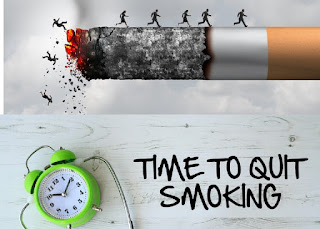 |
| Quit Smoking, Don't Quit Life (You Can Quit Too) |
You have decided to quit smoking. Congratulations! Your first smoke-free day can be tough. Here are five steps to help you overcome the challenges of the day you quit and maintain your determination to keep quitting.
Make a quit plan!
Having a plan makes your first day of quitting easier. A quit plan includes ways to stay focused, confident, and determined. You can create your own quit plan or find one that works for you. If you don't know which quit method is right for you, explore different quit methods. No one quit approach is suitable for everyone. Be honest about your needs. If you have nicotine replacement therapy in your plan, start using it in the morning.
Keeping yourself busy on the day you quit is a great way to avoid smoking. Occupation keeps his mind off smoking and distracts his attention from the craving for cigarettes. You can try some of the following activities:
- To exercise.
- Go for a walk.
- Chewing gum.
- Turning a pen in their hands or reciting a rosary
- Drinking lots of water.
- Take a deep breath and relax.
- Go to cinema.
- Spending time with friends and family members who don't smoke.
- Going out to dinner at your favorite restaurant.
Stay Away From Cigarette Triggers
Triggers are people, things, and situations that trigger your urge to smoke. Try to avoid all triggers the day you quit. Here are some suggestions for avoiding some common smoking triggers:
- If you haven't thrown away your cigarettes, lighters and ashtrays yet, you should.
- Stay away from caffeine, it causes tension. Try drinking water instead.
- Spend time with non-smokers.
- Go to places where smoking is prohibited.
- Get enough rest and eat healthy. Fatigue triggers the urge to smoke.
- Avoid things you associate with smoking by changing your routines.
 |
| Quit Smoking, Don't Quit Life (You Can Quit Too) |
Crises do not last longer than a few minutes. Prepare yourself for this and plan ahead what you are going to do at that moment.
Be Positive
Quitting smoking is difficult. Focusing on the moment reduces difficulties. This approach helps maintain a positive attitude. The day you quit may not go very well. But the only thing that matters is that you don't smoke – not even a puff. Reward yourself for not smoking for 24 hours. You deserved this. If you don't feel ready to quit today, set a suitable quit day. It's okay if you need a few more days to prepare to quit smoking.
Request Help
You don't have to rely solely on willpower to quit smoking. Let your friends and family know about the day you leave. Ask them for support the day you quit and for the next few days and weeks. They can help you get through tough times. Let them know exactly how they can help you. Don't pretend you know.
Prepare to Quit Smoking
Quitting smoking is difficult. But if you have a plan, it's a little easier to let go. Here are some simple steps you can take to get your plan in motion when you're ready to quit.
Know Why You Quit Smoking
Before you quit smoking, it is important that you know why you are quitting. Do you want to be healthier, save money, protect your family? If you're not sure why, ask yourself these questions:
- I don't like what's wrong with smoking.
- What am I missing when I smoke?
- How does smoking affect my health?
- What will happen to me and my family if I continue to smoke?
- In what way will my life be better when I quit?
When you find reasons for quitting, remind yourself of them every day. They may inspire you to quit completely.
Still not sure? Different people have different reasons for quitting. Why do you want to leave?
Learn How to Handle Triggers and Smoking Crises
Triggers are certain people, places, or activities that remind you to smoke. Knowing your smoking triggers will help you learn to cope with them.
Smoking crises are brief but intense urges to smoke. They usually only take a few minutes. Plan ahead and list short activities you can do when you have a crisis.
 |
| Quit Smoking, Don't Quit Life (You Can Quit Too) |
Find Ways to Cope with Deprivation
During the first few weeks after quitting, you may feel uncomfortable and want to smoke strongly. This is because of lack. During abstinence, your body gets used to the lack of nicotine. For most people, the worst symptoms of withdrawal last from a few days to a few weeks. Meanwhile yourself:
- You may feel a little depressed
- you may not be able to sleep
- You may be grumpy, bored or angry
- You may feel anxious, nervous, or restless
- You may have trouble thinking clearly
You may want to smoke to get rid of these feelings. No matter how intense these feelings are, remember that they are temporary.
One of the best ways to deal with nicotine withdrawal is to try nicotine replacement therapy (NYCT). NYKT reduces withdrawal symptoms. NYKT doubles your chances of quitting smoking. NYKT gum is available in a variety of forms including patches, nasal spray, inhaler, and lozenge. A lot of research has been done on NYKT. It has been shown to be safe and effective for nearly all smokers who want to quit, including adolescents. However, if you have a serious illness or are pregnant, you should consult your doctor about NYCT.
If you're planning NYKT, remember that you should have it on the day you leave. Read and carefully follow the instructions on the NYKT box. NYKT will give you the best benefit if you use it as recommended.
Explore Smoking Cessation Options
Quitting smoking on your own is difficult, but quitting abruptly isn't your only option. Choosing another option can increase the chances of success. Find a quit method that may be right for you.
Tell your family and friends that you are planning to quit smoking
Quitting smoking is easier when the people in your life are supportive. Tell them about your quit plans and explain how they can help.
Here are some suggestions:
- Tell your family and friends your reasons for quitting.
- Ask them to check on you to see how things are going.
- Ask them to help you find non-smoking activities you can do together (like going to the movies or a nice restaurant).
- Ask a friend or family member who smokes to quit with you, or at least not smoke around you.
- Ask your friends and family not to give you cigarettes no matter what you say or do.
- Warn your family and friends that your mood may be bad during quitting. Ask them to be patient and help you.
Support is one of the keys to quit success. Find more ways of support to help you quit.
No comments:
Post a Comment